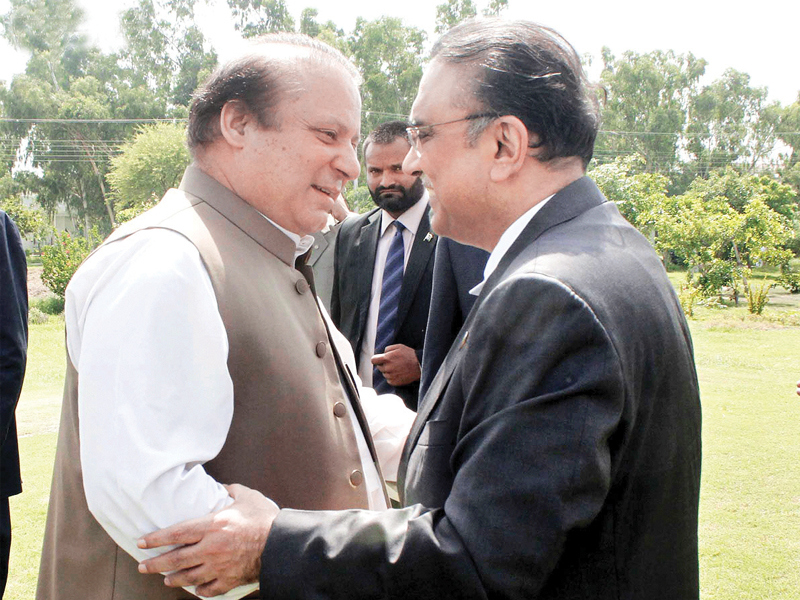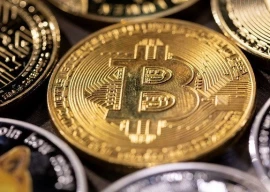
It will be easy at that point for the PML-N to claim that their performance on the economy is better than the Pakistan Peoples Party. But if current trends hold for the next three years, they will likely be very wrong.
On the surface, the economy looks better. GDP growth is picking up to close to 5%, foreign direct investment is up, and inflation is declining. None of these, however, is due to the efforts of the Nawaz administration. If anything, the actions taken by Finance Minister Ishaq Dar and his cabinet colleagues appear to have lessened the positive impact of the exogenous economic shock causing all of these positive numbers: lower global oil prices.
Here is how the major economic variables are related to oil prices.
It is a little known fact to most Pakistanis but the base load of electricity generation in the country is actually handled by the independent power producers, most of whom run their plants on furnace oil. The cost of producing electricity in Pakistan, in other words, is highly correlated with the price of oil. Government subsidies on electricity, which accounted for half of the budget deficit during the PPP administration, as a result, will be much lower, making government finances look better without the finance ministry or the Federal Board of Revenue (FBR) doing anything to streamline expenses or crack down on tax evasion.
Meanwhile, inflation starts to go lower as lower oil prices hit the Consumer Price Index (CPI). In addition to their direct weight in the inflation index, lower oil prices also stabilise the prices of other goods since the cost of transportation and energy is often baked into their prices.
Once again, another key economic indicator – inflation – starts looking good through no effort on the part of the government.
Lower inflation, in turn, allows the State Bank of Pakistan to reduce interest rates, which tends to spur economic activity, resulting in the higher GDP growth number. Higher economic growth rates tend to attract greater foreign direct investment. Once again, all of this improvement accomplished almost entirely without government help.
The inefficiency of the state-owned electricity transmission and distribution companies – both in collecting bills as well as in preventing theft – was particularly difficult to hide when oil prices were at $140 a barrel. It is going to be a lot easier now that oil is trading below $50 per barrel. It will even be easier for the government to reduce power outages over the next few years as the impact of lower oil prices fully kicks in. That should further improve economic growth rates.
The PML-N will, of course, take credit for all of these improvements, even though the Nawaz administration has actually made matters worse.
Tax collection, for instance, is growing at an even more anemic pace than under the PPP, which suggests that far from cracking down on tax evasion, the current government is actually allowing more of it. Bill collection at state-owned electricity distribution companies – particularly in Punjab – is declining very rapidly, from the high-90% range to the mid-80% range, suggesting that electricity theft is becoming even more rampant than ever before.
Meanwhile, Finance Minister Ishaq Dar will continue to take credit for an economic performance that he had nothing to do with improving and plenty to do with worsening. Imagine how much higher the GDP growth rate could be if it is 5% right now, with the government actively making matters worse.
In reality, though, it is not really Dar’s fault. He is an accountant by profession, trained to look at numbers and report them in the best possible manner. The underlying economics behind them is not really his job. The person at fault is the one who put an accountant in the role of a strategy manager. That person should be held accountable most of all, and likely will in the 2018 elections.
The writer is a staff correspondent
Published in The Express Tribune, January 26th, 2015.
Like Business on Facebook, follow @TribuneBiz on Twitter to stay informed and join in the conversation.
COMMENTS (9)
Comments are moderated and generally will be posted if they are on-topic and not abusive.
For more information, please see our Comments FAQ

1725612926-0/Tribune-Pic-(8)1725612926-0-165x106.webp)















It is true PML-N government is claiming credit for things that happen in international market and their supporters continue to believe that without thinking. When price of oil has gone down from around 150 $/barrel to 50$/barrel how is it the government's achievement ?.
Reality is so far from what the government claims , asides from a few infrastructure projects (with questionable conduct), there are no concrete steps taken by the government to address the country's core problems
No serious efforts to tackle load shedding - no focus on improving hydel, coal or other forms of generation) full reliance of expensive and inefficient oil based power generation units No serious efforts to address gas crisis (in fact it is only worsening) No recovery of manufacturing sector and revival of local industry No modernization of the industry Increased taxes but no increase in Tax-to-GDP ratioThe so called "better" period of the economy is only short term.
"Higher economic growth rates tend to attract greater foreign direct investment."
Not in Pakistan which is a pariah state. The US fed is expected to raise interest rates soon so investors will be pulling out of emerging economies anyway.
@KHK: "2- How came USD-PKR parity improved from 110 to 98 even before oil prices fell. And how does we have 15b foreign exchange reserves?"
We have around $10 billion forex reserves with the SBP. The rest are with commercial banks and are actually the savings of private individuals and businesses. They not counted as part of official forex reserves anywhere else in the world. Certainly not by IFIs like the IMF and World Bank.
The reason we have even $10 billion is because we got bailed out by the IMF and we borrowed $2 billion at exorbitant interest rates.
The reason the rupee strengthened is because of those bailouts and because the government controls the oil and gas sector and has been denying public sector oil companies from buying dollars to import fuel. As a result of that we had that petrol crisis that we just went through.
The other reason is that real interest rates are in positive territory. This is on recommendation of the IMF which made similar recommendations to the PPP government but they were unable to follow through because inflation was way too high back then. Now with inflation moderating (due to a decline in global oil prices) you can have positive real interests without it getting too costly for the largest borrower in the country i.e. the government itself.
In short it is all manipulation by the government which is not difficult to do when you are by far the largest player in the currency market for PKR.
What is difficult is keeping up this distortion of the market for long. Our trade deficit is growing because imports are cheap and our exports expensive for foreign buyers. The rupee will correct eventually or we'll continue to bleed forex reserves and go running cap in hand to the IMF again.
Why is it a matter of who is going to take credit. People have elected PML-N and they deserve to deliver. Isn't this type of attitude exactly Imran Khan is afraid of ?
@Random Passerby: Dar is accountant not economist,
Although the article is written nicely but there are certainly some areas where he needs improvement. For eg. the writer is not particularly fond of accountants even though Mr. Dar is a Chartered Accountant. The writer would have fared far better had he not gone into the economist accountant rivalry.
Comparing mat black........with shiny black, really makes no sense....both are still black.
Do not get this hatred for Dar's profession by "economists". Shaukat Aziz was not exactly an economist, he was a banker, and we had economists as finance ministers during the PPP's regime and they hardly made an impact.
In a country like Pakistan, we need a finance minister who is politically connected, and Dar fits that role perfectly. What Dar can do however, is to have economists as advisers and consider their opinion before taking important decisions.
Two questions: 1- Who would have been responsible for bad economy, had the oil prices doubled? 2- How came USD-PKR parity improved from 110 to 98 even before oil prices fell. And how does we have 15b foreign exchange reserves?
My friend its an economy related article, so u shud talk with solid facts and figures rather than saying things like "tax growth is even more anemic...", y not put figures along with it.